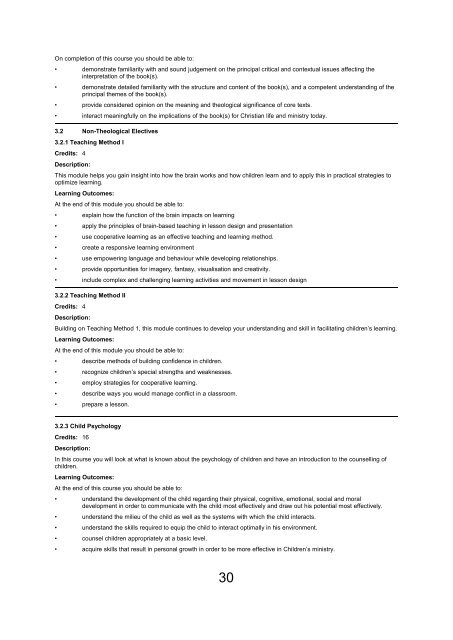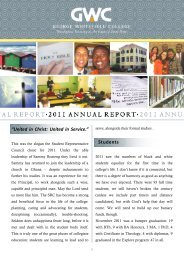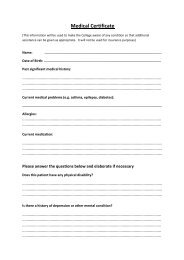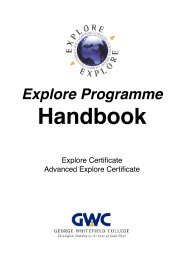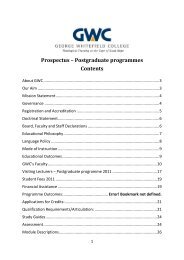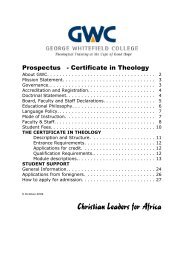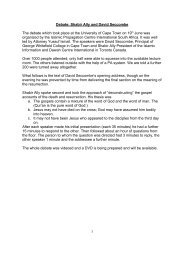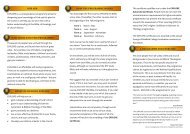Prospectus Bachelor of Theology Christian Leaders for Africa
Prospectus Bachelor of Theology Christian Leaders for Africa
Prospectus Bachelor of Theology Christian Leaders for Africa
Create successful ePaper yourself
Turn your PDF publications into a flip-book with our unique Google optimized e-Paper software.
On completion <strong>of</strong> this course you should be able to:<br />
• demonstrate familiarity with and sound judgement on the principal critical and contextual issues affecting the<br />
interpretation <strong>of</strong> the book(s).<br />
• demonstrate detailed familiarity with the structure and content <strong>of</strong> the book(s), and a competent understanding <strong>of</strong> the<br />
principal themes <strong>of</strong> the book(s).<br />
• provide considered opinion on the meaning and theological significance <strong>of</strong> core texts.<br />
• interact meaningfully on the implications <strong>of</strong> the book(s) <strong>for</strong> <strong>Christian</strong> life and ministry today.<br />
3.2 Non-Theological Electives<br />
3.2.1 Teaching Method I<br />
Credits: 4<br />
Description:<br />
This module helps you gain insight into how the brain works and how children learn and to apply this in practical strategies to<br />
optimize learning.<br />
Learning Outcomes:<br />
At the end <strong>of</strong> this module you should be able to:<br />
• explain how the function <strong>of</strong> the brain impacts on learning<br />
• apply the principles <strong>of</strong> brain-based teaching in lesson design and presentation<br />
• use cooperative learning as an effective teaching and learning method.<br />
• create a responsive learning environment<br />
• use empowering language and behaviour while developing relationships.<br />
• provide opportunities <strong>for</strong> imagery, fantasy, visualisation and creativity.<br />
• include complex and challenging learning activities and movement in lesson design<br />
3.2.2 Teaching Method II<br />
Credits: 4<br />
Description:<br />
Building on Teaching Method 1, this module continues to develop your understanding and skill in facilitating children’s learning.<br />
Learning Outcomes:<br />
At the end <strong>of</strong> this module you should be able to:<br />
• describe methods <strong>of</strong> building confidence in children.<br />
• recognize children’s special strengths and weaknesses.<br />
• employ strategies <strong>for</strong> cooperative learning.<br />
• describe ways you would manage conflict in a classroom.<br />
• prepare a lesson.<br />
3.2.3 Child Psychology<br />
Credits: 16<br />
Description:<br />
In this course you will look at what is known about the psychology <strong>of</strong> children and have an introduction to the counselling <strong>of</strong><br />
children.<br />
Learning Outcomes:<br />
At the end <strong>of</strong> this course you should be able to:<br />
• understand the development <strong>of</strong> the child regarding their physical, cognitive, emotional, social and moral<br />
development in order to communicate with the child most effectively and draw out his potential most effectively.<br />
• understand the milieu <strong>of</strong> the child as well as the systems with which the child interacts.<br />
• understand the skills required to equip the child to interact optimally in his environment.<br />
• counsel children appropriately at a basic level.<br />
• acquire skills that result in personal growth in order to be more effective in Children’s ministry.<br />
30


